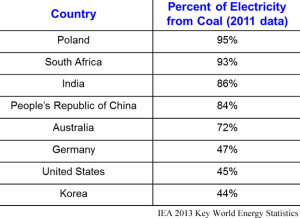
As part of his climate change initiative announced in June, President Obama declared, “Today I’m calling for an end of public financing for new coal plants overseas unless they deploy carbon capture technologies, or there’s no other viable way for the poorest countries to generate electricity.” Restrictions on financing will reduce the supply and increase the cost of electrical power in developing nations, prolonging global poverty.
The World Bank has followed President Obama’s lead, announcing a shift in policy in July, stating that they will provide, “financial support for greenfield coal power generation projects only in rare circumstances.” The bank has provided hundreds of millions in funding for decades to coal-fired projects throughout the developing world.
Also in July, the Export-Import Bank denied financing for the proposed Thai Binh Two coal-fired power plant in Vietnam after “careful environmental review.” While 98 percent of the population of Vietnam has access to electricity, Vietnamese consume only about 1,100 kilowatt-hours per person per year, about one-twelfth of United States usage. Electricity consumption grew 34 percent in Vietnam from 2008 to 2011. The nation needs more power and international funds for coal-fired power projects. But western ideologues try to prevent Vietnam from using coal.
The President, the World Bank, and the Export-Import Bank have accepted the ideology of Climatism, the belief that mankind is causing dangerous climate change. By restricting loans to poor nations, they hope to stop the planet from warming. But what is certain is that their new policies will raise the cost of electricity in poor nations and prolong global poverty.
In most markets, coal is the lowest-cost fuel for producing electricity. According to the International Energy Agency (IEA), world coal and peat usage increased from 24.6 percent of the world’s primary energy supply in 1973 to 28.8 percent of supply in 2011. By comparison, electricity generated from wind and solar sources supplied less that 1 percent of global needs in 2011.
The cost of electricity from natural gas rivals that of coal in the United States, thanks to the hydrofracturing revolution. But natural gas remains a regional fuel. Natural gas prices in Europe are double those in the US and prices in Japan are triple US prices. Until the fracking revolution spreads across the world, the lowest cost fuel for electricity remains coal.
Despite our President’s endorsement, carbon capture technologies are far from a proven solution for electrical power. According the US Department of Energy, carbon capture adds 70 percent to the cost of electricity. In addition, huge quantities of captured carbon dioxide must be transported and stored underground, adding additional cost. There are no utilities currently using carbon capture on a commercial scale.
Coal usage continues to grow. Global coal consumption grew 2.5 percent from 2011 to 2012, the fastest growing hydrocarbon fuel. In 2011, coal was the primary fuel for electricity production in Poland (95%), South Africa (93%), India (86%), China (84%), Australia (72%), Germany (47%), the United States (45%), and Korea (44%). Should we now forbid coal usage in developing nations?
President Obama has stated, “…countries like China and Germany are going all in in the race for clean energy.” But China and Germany are huge coal users and usage is increasing in both nations. More than 50 percent of German electricity now comes from coal as coal fills the gap from closing nuclear plants. Today, China consumes more than 45 percent of the world’s total coal production.
Today, more than 1.2 billion people do not have access to electricity. Hundreds of millions of others struggle with unreliable power. Power outages interrupt factory production, students walk to airports to read under the lights, and schools and hospitals lack vital electrical power.
Electricity is the foundation of a modern industrialized nation. Lack of electricity means poverty, disease, and shortened lifespans. Foolish climate policies lock chains on developing nations.
Originally published in The Washington Times
Steve Goreham is executive director of the Climate Science Coalition of America and author of the book The Mad, Mad, Mad World of Climatism: Mankind and Climate Change Mania.

